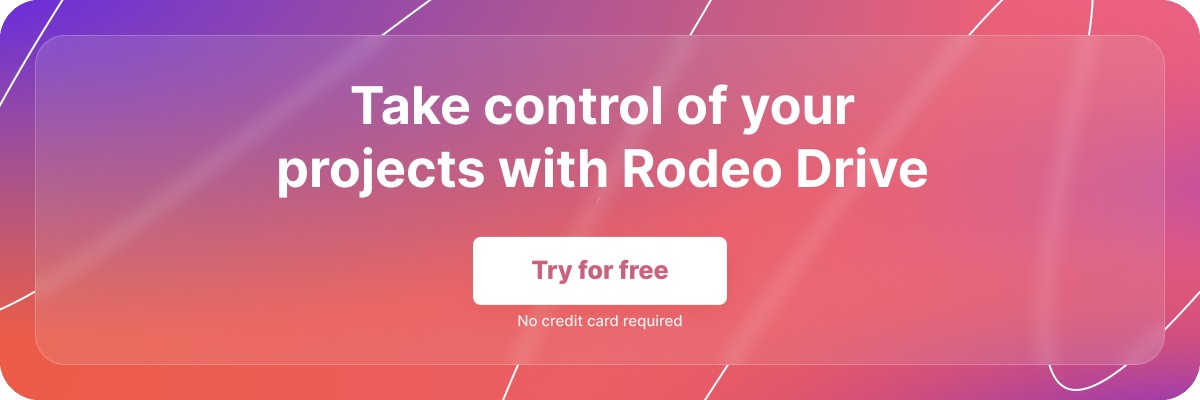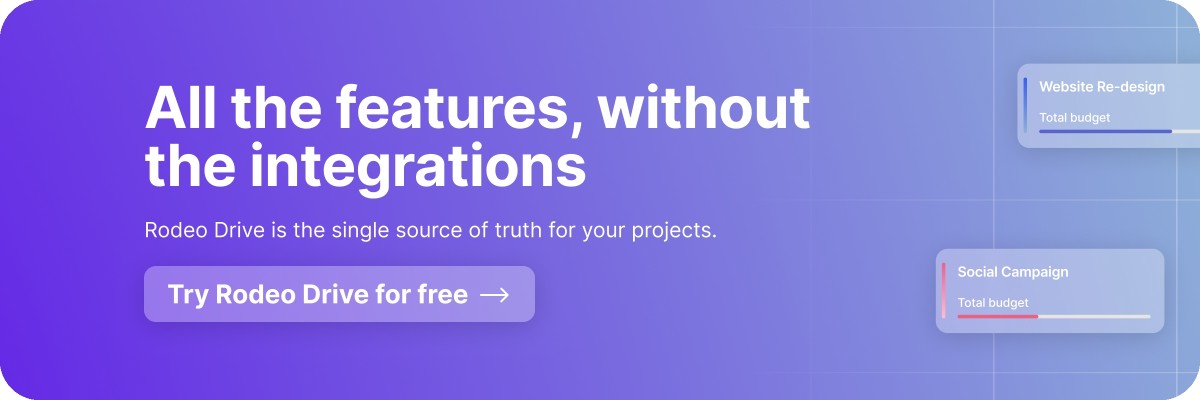How Is a Project Coordinator Different From a Project Manager?
Project managers and project coordinators sound like similar terms. On paper, it doesn’t seem so different to “manage” a project vs. to “coordinate” a project. In project management, though, each term has a distinct meaning.
Let’s discuss the responsibilities of each to understand the respective project management roles they play.
What role does a project coordinator play on the project team?
A project coordinator is a special project team role that facilitates teamwork and tracks progress. They’re responsible for handling the administrative work of large projects, ensuring that everything, from initial plans to a project's final phases, runs without a hitch.
The project coordinator is responsible for working closely with all team members, understanding how each contributes to the project, and staying up-to-date with anything blocking their progress.
Hands-on and dynamic, the project coordinator’s role often needs to adjust to the needs of the project and the team. Project coordinators commonly need to multitask, balancing project schedules, resourcing changes, and tracking budgets.
Overall, a project coordinator needs to have an eye for detail and the ability to proactively address problems as they arise.
Related: Should You Use a Master Schedule for Your Projects? Pros, Cons, and More
Project coordinator vs. project manager
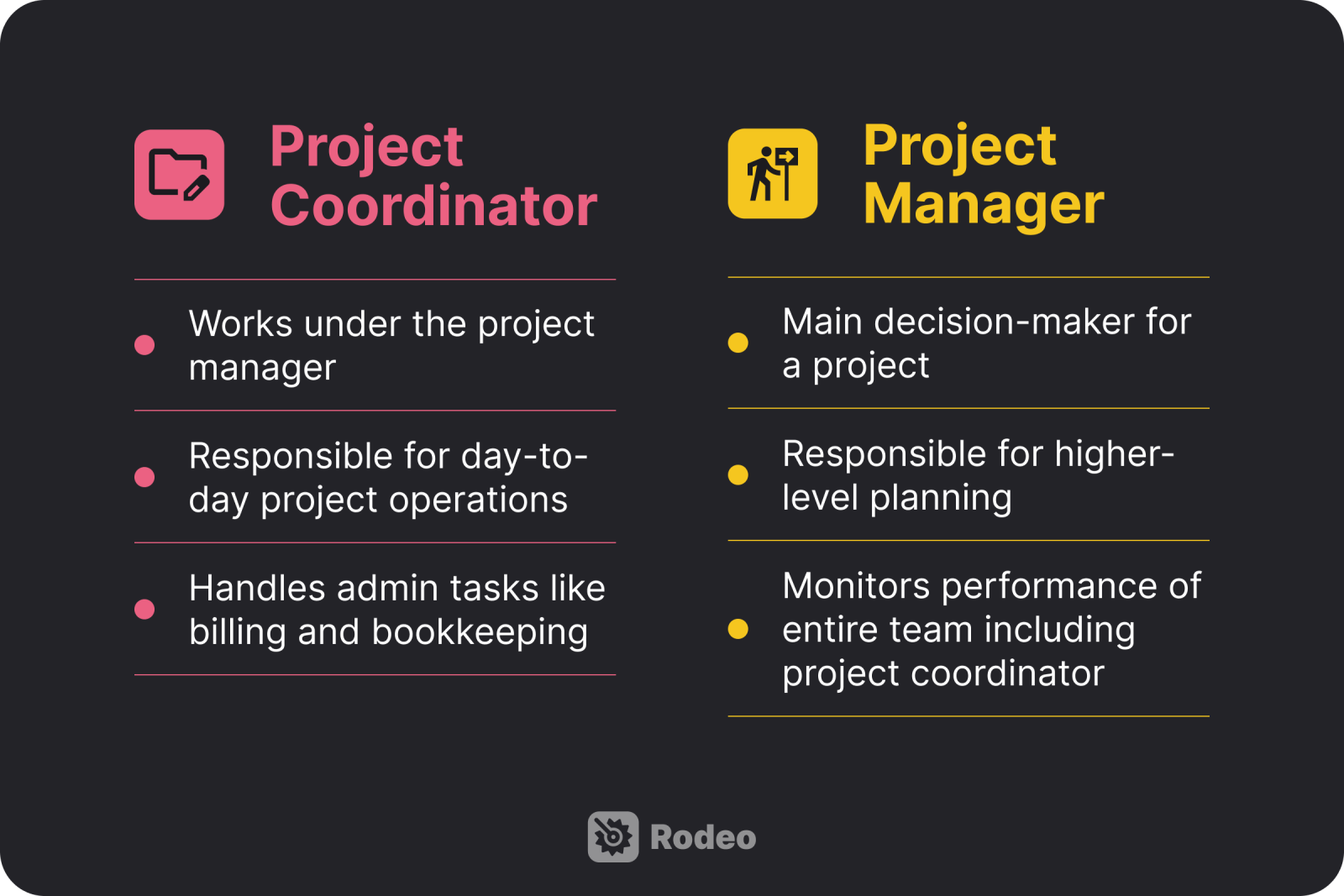
While they work together, project managers and project coordinators have different levels of responsibility and decision-making power.
A project manager oversees the entire project lifecycle. They are responsible for the overall direction and control of a project.
The project coordinator, on the other hand, operates under the project manager’s guidance. Their role is focused on the day-to-day operational aspects of the project. They maintain documentation, organize meetings, and handle issues as they arise.
So while the project manager deals with higher-level strategy and planning, the coordinator administers the details, keeping them in alignment with the bigger picture.
What are the project coordinator's responsibilities?
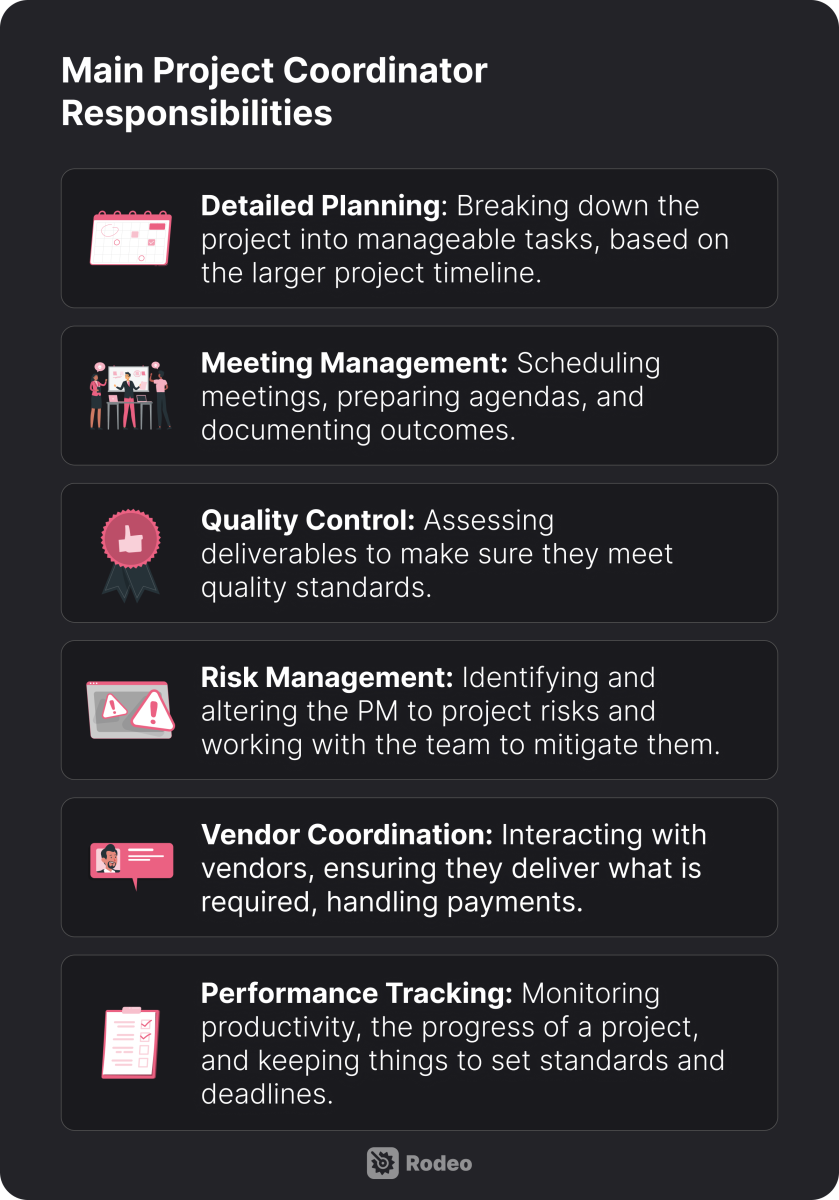
Project coordinators handle a wide range of tasks. Those tasks can vary depending on the size of the project and the nature of the resources they are coordinating. Here are some common project coordinator responsibilities:
- Detailed Planning: Breaking down the project into manageable tasks, based on the larger project timeline.
- Meeting Management: Scheduling and managing meetings, preparing agendas, and documenting outcomes.
- Quality Control: Assessing deliverables to make sure they meet quality standards.
- Risk Management: Identifying project risks and alerting the project manager when they arise. Working with the team to mitigate risks.
- Vendor Coordination: Communicating with vendors, ensuring they deliver what is required, and handling payments.
- Performance Tracking: Monitoring productivity, the progress of a project, and keeping things to set standards and manage deadlines.
The list is pretty long, which is why coordinators help themselves out by using tools and conventions.
For example, if they need to plan project details, they’ll use a Gantt chart template to visually represent and keep track of all project tasks. Or, they might shorten meeting times by setting tight agendas and updating participants with necessary information beforehand.
Necessary skills for project coordinators
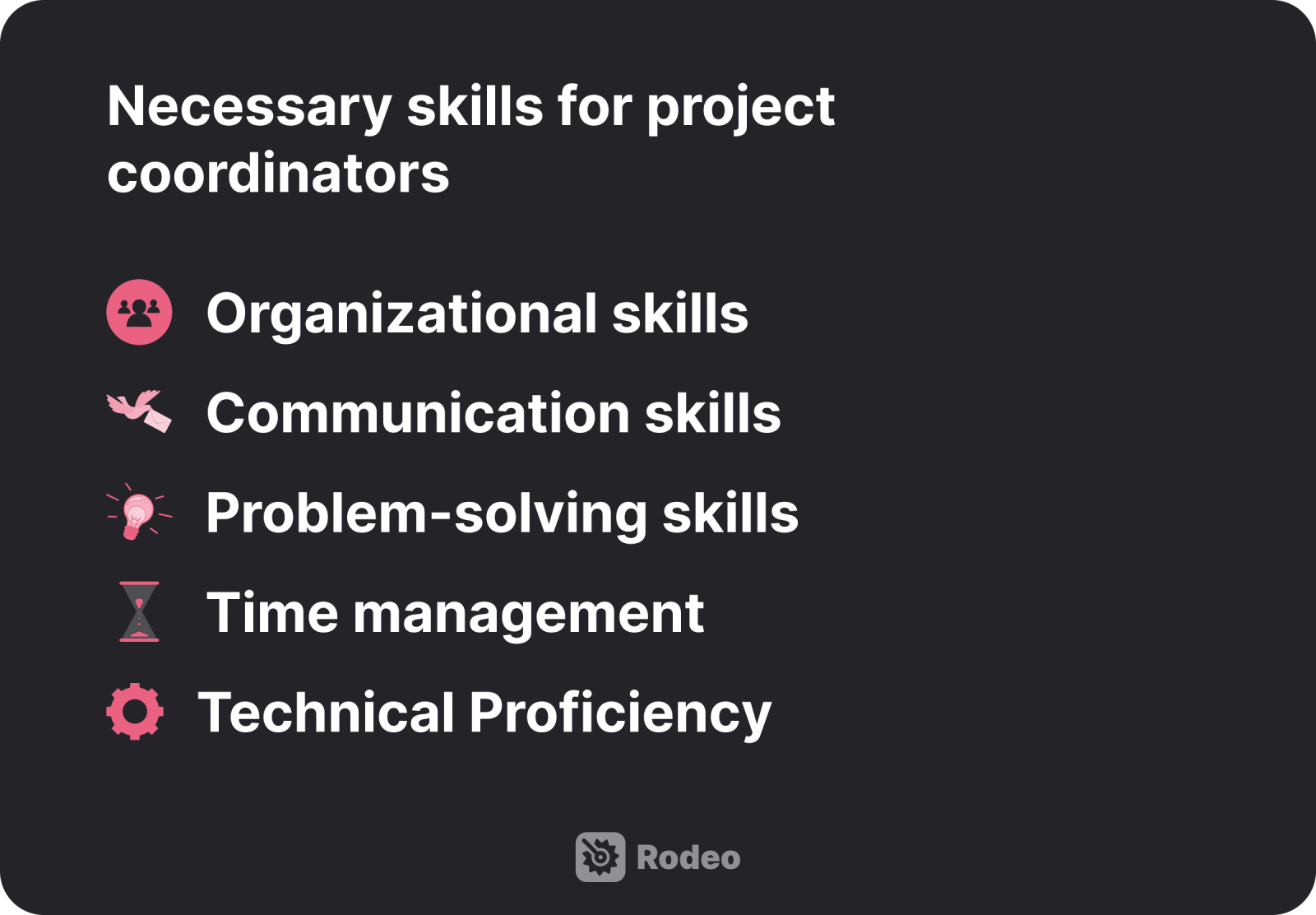
A project coordinator needs to develop a range of soft skills to handle their different responsibilities. The most important are organization, communication, problem-solving, time management, and software proficiency.
Organizational skills
Since project coordinators need to handle multiple project elements simultaneously, organizational skills are important. This means the ability to create clear instructions for team members, document management, and stay aware of deliverables and deadlines.
Communication skills
Project coordinators need to convey project updates to stakeholders. They also need to relay information from management back to the team executing the project. Managing project communication entails writing concise emails, presenting updates in meetings, and guiding focus toward the right objectives.
Problem-solving skills
Projects commonly encounter unexpected issues. Coordinators need to be adept at analyzing problems and creating solutions.
For instance, if a key resource suddenly becomes unavailable, delaying the timeline a project coordinator will need to troubleshoot, understand what’s at risk of being delayed, identify alternative strategies, and implement those changes with the team.
That said, tools like risk registers and RAID logs can help project coordinators plan for risks and other issues in advance.
Time management
Effective time management is important for project coordinators. They need to be able to prioritize project tasks and manage both their own time and that of the team. Since project coordinators are more hands-on, they might also need to delegate to make sure no single aspect of the project monopolizes their time.
Technical proficiency
Present-day project management work is software-dependent. So technological literacy is an important part of project coordination. A project coordinator will need to learn how to use project management software, along with whichever internal tools their company employs.
How to become a project coordinator
While no specific certification is needed, many project coordinators enhance their qualifications with certifications like the Certified Associate in Project Management (CAPM) or Project Management Professional (PMP).
Still, gaining hands-on experience is the most important stepping-stone. Be it through internships, volunteer opportunities, or entry-level positions on project teams. Aspiring project coordinators should focus on taking courses to build knowledge and finding opportunities to gain practical experience that displays relevant skills.
In terms of career progression, a project coordinator role positions you to advance to roles like a project manager or a program manager. While experience and proven competence are the most important things, willingness to continuously learn is also instrumental.
Project management made easy with Rodeo Drive
Project coordinators have a lot on their plate. Rodeo Drive is an easy-to-use tool designed to make the job simpler. It has intuitive, built-in workflows for the key tasks a project coordinator needs to tackle. From activity scheduling to budget management, time-tracking, and reporting.
Financially-focused project management
As a project coordinator, you’ll often need to send invoices, handle expense reports, and communicate with vendors. The good news is that Rodeo Drive puts finances at the forefront of project management.
Invoicing in Rodeo Drive is simple. Once your project manager puts a budget in place, you can automatically generate either a custom invoice, an invoice based on the initially proposed budget, or an invoice based on the actual costs of the project. You can preset invoices to include custom branding along with your terms and conditions.
From there, users in the UK, Belgium, and the Netherlands can send invoices directly through the platform. For US-based businesses, Rodeo Drive integrates with QuickBooks. There is also an Xero integration available for UK-based users.
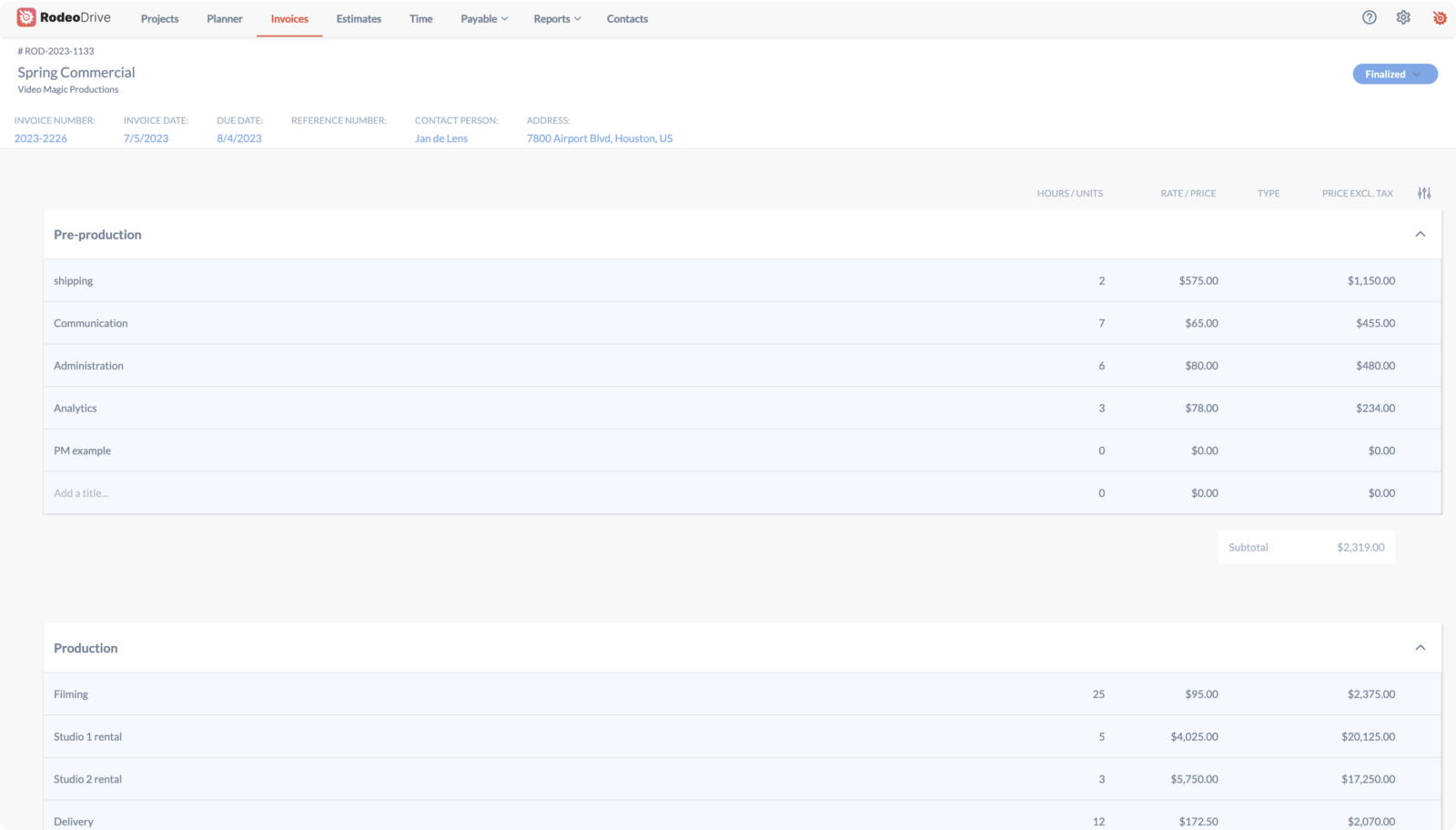
Create and send custom invoices in just a few clicks
Rodeo Drive can also be used to book and track expenses, in addition to drafting purchase orders. From the Expenses section, you can upload received invoices from purchased goods and services and see outstanding costs at a glance. This keeps expenses organized and easy to manage.
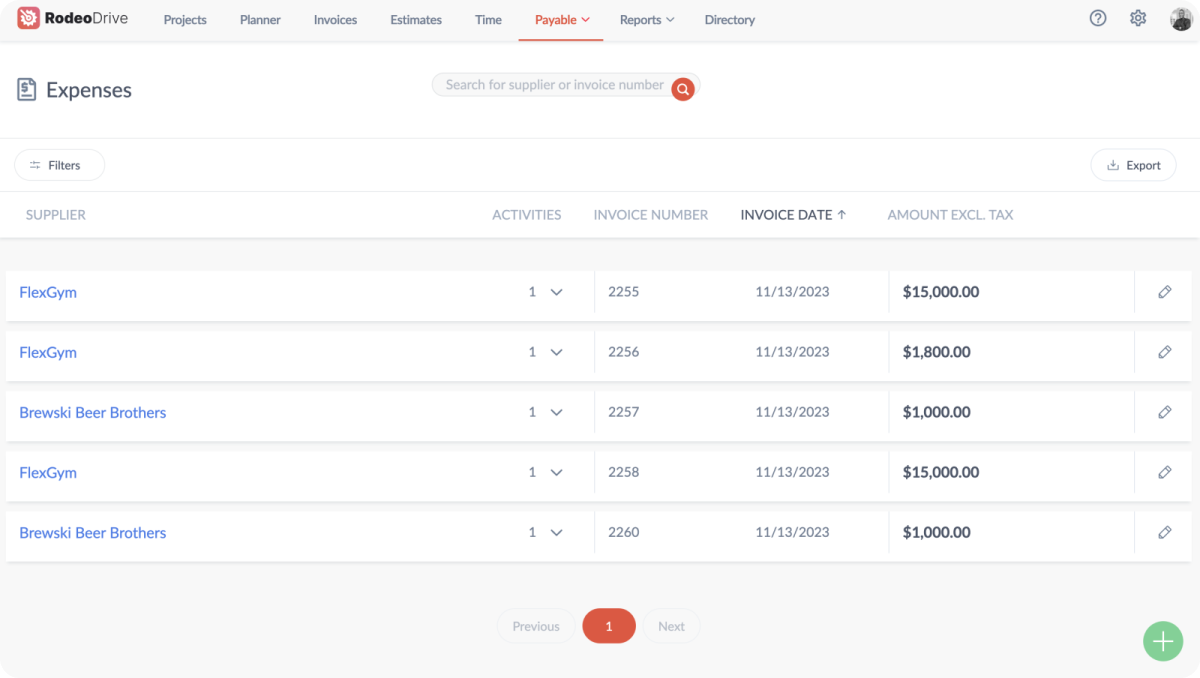
Rodeo Drive helps keep your expenses organized in one place
Plan and reschedule project activities seamlessly
While the project manager will set plans in advance, a coordinator may need to adjust them because of changes that occur as the project progresses.
From the activity planner in Rodeo Drive, you can change the time commitments, assignees, and dates associated with project activities. You can also extend or shorten planned project items to account for changes on the ground. It all works through a straightforward drag-and-drop user interface.
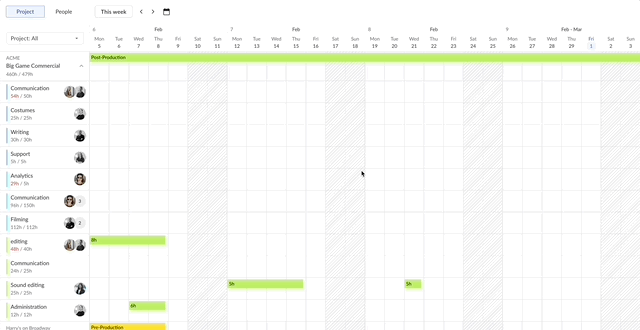
Rescheduling project activities in Rodeo Drive is easy using the tool’s drag-and-drop feature
On the left-hand side of the planner, you can also see planned time allocations for various project activities. This, paired with Rodeo Drive’s time-tracking tool, makes it easy to identify time overspending and price projects accordingly.
Manage team capacity with the people-view planner
An underappreciated aspect of being a project coordinator is you’ll often have your ear closer to the ground. You interact with team members directly, so you’ll have a better idea of their workloads and capacity.
Proper capacity planning plays a large role in keeping your team happy and successful. That’s why we’ve introduced Rodeo Drive’s new people-view planner to help keep your team’s workloads balanced to prevent burnout.
This new feature enables project coordinators to see how many hours each team member is scheduled for. This makes it easier to see if someone is already fully scheduled for a workday, or if they’re overloaded with too many tasks.
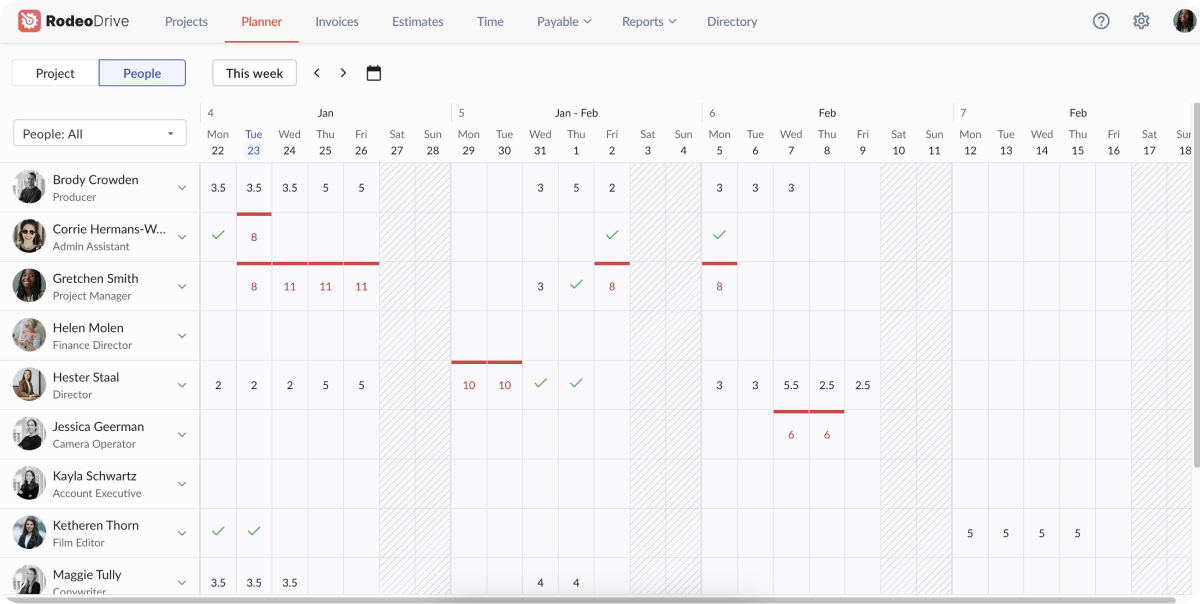
Rodeo Drive’s people-view planner helps prevent team burnout
To get started on coordinating better projects, use Rodeo Drive for free today. No credit card required.





